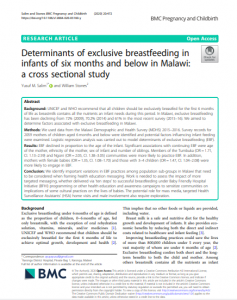
Background
UNICEF and WHO recommend that all children should be exclusively breastfed for the first 6 months of life as breastmilk contains all the nutrients an infant needs during this period. In Malawi, exclusive breastfeeding has been declining from 72% (2009), 70.2% (2014) and 61% in the most recent survey (2015–16). Researchers aimed to determine factors associated with exclusive breastfeeding in Malawi.
Methods
We used data from the Malawi Demographic and Health Survey (MDHS) 2015–2016. Survey records for 2059 mothers of children aged 6 months and below were identified and potential factors influencing infant feeding were examined. Logistic regression analysis was carried out to model determinants of exclusive breastfeeding (EBF).
Results
EBF declined in proportion to the age of the infant. Significant associations with continuing EBF were age of the mother, ethnicity of the mother, sex of infant and number of siblings. Members of the Tumbuka (OR = 1.71, CI. 1.13–2.59) and Ngoni (OR = 2.05, CI. 1.38–3.05) communities were more likely to practice EBF. In addition, mothers with female babies (OR = 1.35, CI. 1.08–1.70) and those with 3–4 children (OR = 1.47, CI. 1.04–2.08) were more likely to engage in EBF.